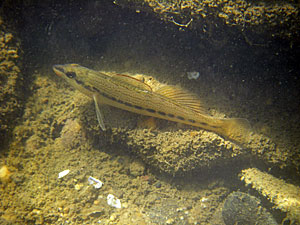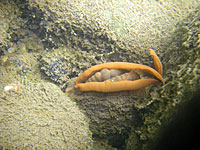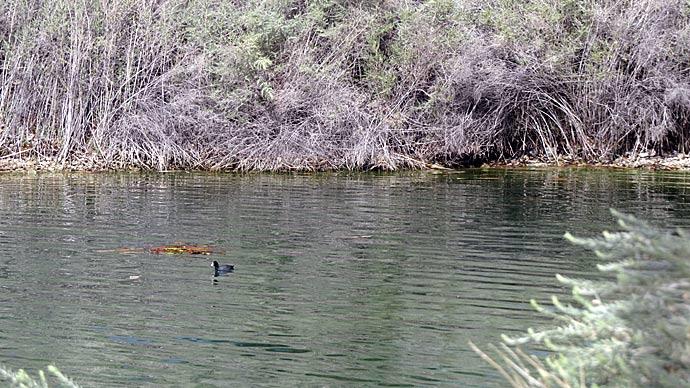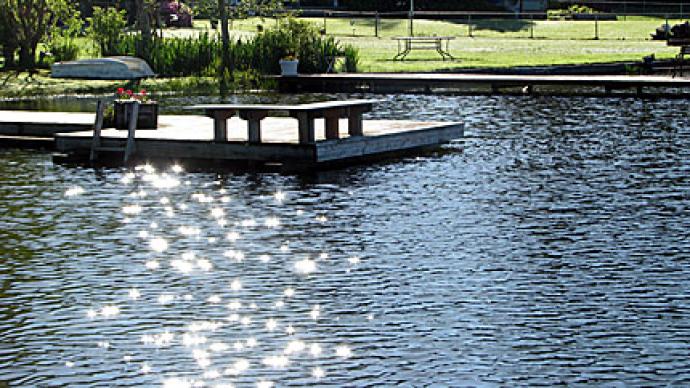
A couple of years ago I was lucky enough to land a job researching tiny, endangered fishes on a couple of scenic rivers in eastern Tennessee. The problem was that these small, non-game, native fishes were very rare and especially prone to extinction. After a year or two of cruising up and down these beautiful rivers, my dad, a long time bass angler, got curious and asked me a question that I had never fully considered. "Why does it matter?" I struggled to answer his question, citing vaguely the scientific jargon that was passed onto me in my fisheries and conservation classes. I probably didn't do a good job of convincing him that it matters, but the research kept me employed, paid the bills and prevented me from moving back home. So in that sense, I am sure it mattered to my dad. But the question still remains. Should a bass angler be concerned that so many fishes in North America are endangered and threatened? Is the money spent on research and recovery of these fishes justified or should we just let them go extinct, instead using the money to enhance our sport fisheries? It is definitely a hard sell, and debate on this topic between anglers, scientists, and managers could last indefinitely. So I would like to argue that, indeed, it does matter. While I don't expect anglers to immediately agree, I believe it is a worthwhile topic for discussion.
To be honest, it probably does not matter to the average bass angler. But it probably does matter to the bass. And it should matter to an angler, in my opinion. Last year, I closely monitored the drought in the southeastern U.S., especially in Atlanta, as I frequently traveled to that area. Because of the drought, water was scarce, and reservoirs were very low. What drew the ire of anglers, boaters, and businesses (and the public in general) along the shores of Lake Lanier was that, although the reservoir was more than twenty feet below normal, water was being released through the dam. There were two primary reasons for this. First, people downstream needed the water, which was evidenced by the water rights fight between the states of Georgia, Florida, and also Alabama. People need water regardless of where they live, and although Georgia would have liked to keep all of the water to use themselves, it is a basic right for others to want access to water in a watershed. It was the second reason that was given that drove people nuts. Water was being released to meet minimum flow requirements required for the survival of endangered freshwater mussels downstream. The common response, in general, was "Hey, people are more important than some stupid clams! Let them die." It is difficult to argue in favor of the mussels in this situation. However, instead of asking, "Why are we releasing water for mussels?" perhaps the more important question is "Why are the mussels endangered in the first place?"
Endangered species took a beating in the media last summer, but there are some facts that were not mentioned nor considered. First, Atlanta, one of our largest cities, is located far upstream in the Chattahoochie River watershed. Even under ideal conditions, the drainage basin is not a large enough to supply enough water for all the people. As a result, the city consumes a large amount of water, probably too much. The problem here is growth and too much of it. Secondly, potential solutions to the drought were to build more reservoirs (a good thing for any angler) to trap more water. The construction of reservoirs is one thing that has endangered many fishes.
What's my point? People are the problem and the reason species are becoming extinct at a higher rate. More directly, we often fail to see the benefits that species such as freshwater mussels and small fishes provide. It is easy to measure the benefits of largemouth bass for example. We can measure it in the joy it gives us to pursue and catch them, in the bonds shared between father and son during a day on the water, or in economic terms such as the money spent on tackle, boats, etc. These are all good things that contribute to our social well-being and to conservation of fisheries. But it is difficult to measure the benefits of a small, endangered fish. Exactly how do these fish benefit a bass angler? Here's how.
Let me start with the altruistic view (or "tree hugger" view for some of you). We should conserve a species just because it exists. Its existence is important because it is unique and irreplaceable and, in some way, its continued existence says something about human society as a whole. In other words, just as we have the right to exist, other species have the right to exist, and we should not interfere with that right. Now, let's be honest. Most of us don't subscribe to this view so let's talk about something more relevant to bass anglers.
Endangered stream fishes like the ones I have worked with compose some of the forage base. I cannot tell you how many times I have been snorkeling underwater, turning over rocks to look for tiny fish, only see at my side a smallmouth or spotted bass swimming beside me, trying to see if I expose an easy meal. Many times, they will dart in front of me and eat any small crayfish that happens to scurry out from the rock. It is an amazing sight to see first-hand, but also sobering if you consider that many species of crayfish are also becoming endangered. In some cases, I will have to shoo away bass so they won't eat an endangered fish if I think I am about to find one. Loss of one species may have a detrimental effect up the food chain to a large predator like a bass, leading to declines in their numbers as well.

Many of these fish are hosts for freshwater mussel larvae. To explain, a freshwater mussel actually requires a fish host to reproduce and will "spit" its larvae onto a fish's gills. The larvae will attach to the gills, eventually drop off, and grow. Furthermore, some mussels are picky, with only one or two species of fish capable of serving as hosts. Therefore, if the fish goes extinct then so will that particular species of freshwater mussel. Mussels, themselves, are very important to the health of a stream or lake, and also to the angler. I can easily recall my last fishing trip to the Tennessee River where my dad, brother and I bonded while catching fish after fish from a bed of mussels. Any angler who locates a productive mussel bed can potentially satisfy their thirst for bass. Mussels also stabilize banks and bottoms to prevent erosion. But most importantly, mussels filter water and provide us with cleaner, healthier water. The largest threat to freshwater fisheries is water quality, and mussels actually help us fight the battle against poor water quality. Of course, we must also mention that mussels can be food as well for many organisms in the food web.
Because of the services or benefits to the ecosystem that these species provide, they are critical to the sustained health of a body of water. When these species begin to decrease in number, it can indicate that there is a problem with the health of a water body, and therefore, they are routinely referred to as "indicator" species. Many biologists study these species to assess, indirectly, the health of a river or stream. Most endangered fishes are found in rivers and streams, and can indicate a decrease in the health of a river. Therefore, the study and monitoring of these species will most likely benefit any dedicated river angler. It is important to remember that water bodies are connected in someway, from upstream to downstream. As a result, any problem upstream will eventually become a problem downstream. Whether someone is a bank fisherman, river angler, or a competitive angler, we are all interested in maintaining healthy and productive fisheries.
The truth is that we do not know all of the reasons why these species are important. They may not play a role in maintaining a bass fishery and, thus, may not matter to a bass angler. But the overall message is that we do not know it all yet. It may not matter, or it may be crucial. Ecologists and biologists are constantly working to figure out the complex operation of ecosystems. Organisms in ecosystems are linked and connected in so many various ways that it can be difficult to comprehend and predict. Think of an ecosystem as a house, supported by the various species found within it. Perhaps the bass are the people living in the house, the foundation is the substrate or bottom, and the small fish species the studs in the walls. If we remove a few studs, the house may still stand. But how many studs can we remove until it all comes crashing down? That is the million-dollar question. We do not know. How many species can go extinct until the ecosystem collapses? How many small fish species do we lose before we see an affect on large predatory fishes like largemouth or smallmouth bass? We just don't know, and that is the scary part.
Maybe this article convinced you that endangered fish are important to you, and maybe it left more questions than answers. This should be a topic that as anglers and de facto conservationists we should consider in a growing world that pressures both natural resources and nature to a greater and greater degree. I think about the discovery of plant species in the tropical rain forests of the world that led to development of new medicines, and then I think about all those plant species already destroyed and lost, along with all the potential medical benefits that were lost forever as well. I surely wouldn't want to lose any of the benefits we get from the endangered freshwater species and later learn they were critically important, especially if they can benefit my bass fishing in some way. I do know one thing for sure though. I can give my dad a better answer now.
Johnathan Davis is a research biologist at Tennessee Technological University and holds a B.S. and M.S. in fisheries science.
Reprinted with permission from Pond Boss Magazine


